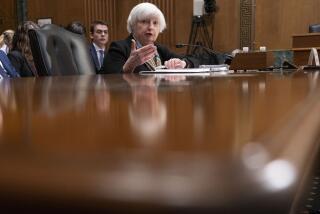U.S. economy needs big banks, not Glass-Steagall, bank groups say
WASHINGTON -- The call by former Citigroup executive Sanford “Sandy” Weill to break up big banks continued to reverberate through the industry Friday as two leading trade associations said that large banks were crucial to the U.S. economy.
“While I have great respect for Sandy Weill, I’m dismayed by his comments supporting the breakup of our country’s largest banks,” said Frank Keating, president of the American Bankers Assn., whose members include those firms.
“Reducing the size of our largest banks would severely diminish their capacity to serve America’s largest businesses, driving corporations to foreign competitors that would quickly move to meet their financial needs,” he continued.
Keating warned that “financing would gravitate more heavily to the lightly regulated ‘shadow’ banking system and our country’s status as the world’s premier financial center would be in grave peril.” While no bank should be too big to fail, he said. “these types of misguided proposals aren’t the solution and would damage our still-recovering economy.”
At the same time, the Clearing House, a consortium of the world’s largest banks, issued a report saying the U.S. banking system is the right scale for its economy and is less concentrated than systems in other major developed nations.
The organization said that the five largest U.S. banks account for 56% of the nation’s banking assets. That’s the lowest percentage of any of the Group of Seven leading industrialized economies.
“Large banks provide unique contributions to the U.S. economy, including unique products and services, economies of scale, and the promotion of innovation,” the Clearing House report said.
Weill, who helped build Citigroup into a mega-bank, stunned the financial sector Wednesday when he called for the breakup of large banks. He said Congress should reinstate the Glass-Steagall prohibition against deposit-taking institutions from also operating as investment banks.
Some lawmakers, consumer advocates and smaller bankers have been calling for such a move in the wake of the financial crisis and continued banking controversies, such as the rate-rigging scandal surrounding the London Interbank Offered Rate, or Libor.
Reinstating Glass-Steagall, which was in place from the Great Depression until 1999, would reduce the size of the biggest banks by forcing them to spin off their investment banking units. Removing investment banking would also reduce risk-taking by depository institutions, supporters said.
Camden Fine, president of the Independent Community Bankers of America, which represents small banks, cheered Weill’s comments.
“There is a growing chorus of support for downsizing too-big-to-fail financial institutions, which enjoy implicit government support and continually put our nation’s taxpayers at risk,” he said. “Splitting up these systemically risky financial firms will help restore discipline to the financial markets and prevent future crises, which would have a devastating impact on community banks and the communities they serve.”
But Keating, whose group represents banks of all sizes, said Glass-Steagall would not have prevented the financial crisis. Opponents of Glass-Steagall note that the major firms whose troubles triggered the crisis, Bear Stearns, Lehman Bros., and American International Group, were not deposit-taking banks.
“It’s time to push the pause button on flawed proposals that would damage the U.S. economy,” he said. “Those calling for a return to Glass-Steagall to solve the world’s economic problems simply aren’t looking at the facts.”
ALSO:
Economic growth slows as consumers pull back
Libor rate-rigging scandal intensifies pressure on Wall St.
Break up big banks, former Citigroup CEO Sanford Weill urges
More to Read
Inside the business of entertainment
The Wide Shot brings you news, analysis and insights on everything from streaming wars to production — and what it all means for the future.
You may occasionally receive promotional content from the Los Angeles Times.











